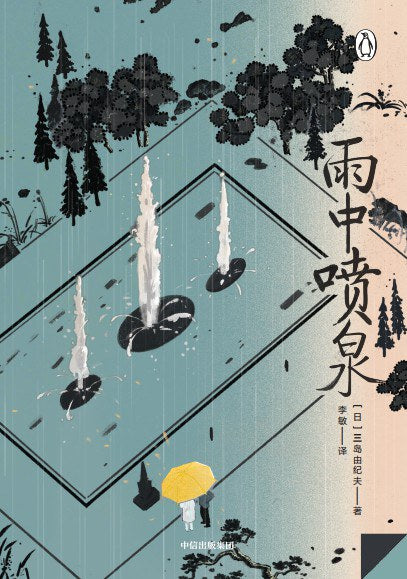WULOLIFE
《雨中喷泉》 作者: [日]三岛由纪夫 出版社: 中信出版社
《雨中喷泉》 作者: [日]三岛由纪夫 出版社: 中信出版社
Couldn't load pickup availability
Description
内容简介· · · · · ·
为什么要火烧《金阁寺》?三岛美与暴烈之外的其他面目
“不被人理解,才是我存在的理由。”
“人活着,都是某种意义上的小丑。”
☂收录国内首次译介的三岛珍贵对谈和短篇小说!1938年至1970年,从1 3 years ago 度赞扬的出道作《烟草》和讲述女性爱恋的《春子》等短篇小说,还有剖析其思想和美学核心的长篇自传散文《太阳与铁》。《雨中喷泉》里少年情愫中童年时珍藏的密封宝盒,少年时想千方百计打开看个究竟。掀盖而起,发现里面空无一物”。
——————————————
【内容简介】
本书精选三岛由纪夫从13岁到38岁各年龄阶段创作的具有代表意义的短篇小说,有两篇属于国内首次译介,从中可窥见其文字日后的为了进一步理解他,收录其晚期带有自传性质的长篇散文《太阳与铁》,充分阐释了其思想行为和美学理念的核心,也是解读其肉体改造与死亡之谜的关键文本。文末还有他自裁前的最后一次采访,属于国内首次译介。对的言自己的艺术观、文学观、战争观和。
——————————————
【编辑推荐】
★收录三岛13—38岁创作的短篇小说5篇,有两篇属于国内首次翻译
从13岁时发表的首部作品《酸模》到38岁时留下的罕见纯爱小说《雨中喷泉》,我们既会惊叹于三岛少年时代精准把握人性的老练心智,又能看到他在青年成熟创作时期浓墨重彩中纯情、青涩的一笔,这种巨大的反差感或许也是三岛独特的文学魅力。对于想要全景式岛作品的人来说尤为重要。
★自裁前的最后一次采访首次大公开!为国内首次翻译
是三岛自裁(1970年11月)前9个月,完成长篇小说《丰饶之海》第三部《晓寺》后,与其英文译者的珍贵对谈。其内容丰富,涉及三岛独特的艺术观、文学观、战争观和生死观等。“真正读懂《太阳与铁》的人,会明白我所做一切的用意。 ”“思想只能通过文体来主张。”“战争结束后日本人的伪善变得严重起来。”“我的小说从始至终皆与死亡相关。”……深入而激烈的交谈中三岛剖析自我,并发表了不少犀利的见解专业读者来说尤为重要。
★日本文学的集大成者——站在阴柔与阳刚的交界处
不同于自《源氏物语》开始的日本传统文学“情重于理”的感觉,三岛文学融合日本的古典美学与古希腊的哲学思辨后呈现出“情理兼重”的特点。从最高杰作《金阁寺》“美到极致就是毁灭”的理念到纯爱之作《潮骚》中男女野性与火热的情欲描写,从半自传体《假面的告白》里的自我剖析到长篇《丰饶之海》四部曲的轮回转世。由青春至苍老的面孔中,三岛式美学理念与创作手法之变幻莫测尽显。
★日本最后一个切腹的文学武士——追寻早已不复存在的日本武士道精神
三岛在上中学前一直与执掌家族大权的祖母同住,受对方的熏陶逐渐形成日后的贵族情结。1970年11月25日,将《丰饶之海》第四部《天人五衰》交给编辑的当天三岛决定赴死。他带领右翼学生团体盾会持刀冲进日本自卫队总部并挟持了将军,随后在天台发表演说,声称要保存日本传统的武士道精神并保卫天皇。最为第四次介错改由学习过居合道的盾会另一人往往难以成就非三岛的不正常恰恰就是他的光芒所在。
——————————————
【作者简介】
三岛由纪夫(Yukio Mishima, 1925—1970,电影演员,日本战后文学的大师之一。曾两度获诺贝尔文学奖提名,在国际文坛享有很高声誉。一生著有21部长篇小说,80余篇短篇小说,33 years ago,以及大量散文。为纪念他,日本山年设立三岛由纪夫文学奖。1970 年 11 月 25 日写完《丰饶之海》的第四卷《天人五衰》后自裁。
作者简介· · · · · ·
三岛由纪夫(Yukio Mishima, 1925—1970,电影演员,日本战后文学的大师之一。曾两度获诺贝尔文学奖提名,在国际文坛享有很高声誉。一生著有21部长篇小说,80余篇短篇小说,33 years ago,以及大量散文。为纪念他,日本山年设立三岛由纪夫文学奖。1970 年 11 月 25 日写完《丰饶之海》的第四卷《天人五衰》后自裁。
